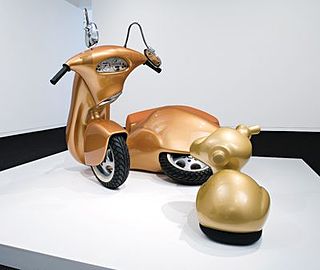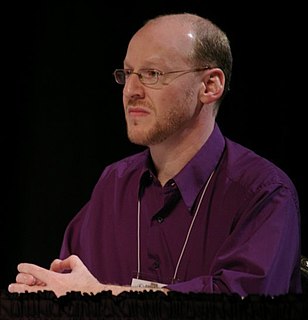A Quote by Jonathon Keats
Just getting totally absorbed in that and therefore when I came back around to [Buckminster Fuller] and found that much of it was made up, I realized that nevertheless, it really was crucial, crucial for how he understood himself, I believe, and certainly crucial for how anyone else ever engaged in his ideas and therefore as a starting point, how can we engage in his ideas today, but with a remove of knowing that it is a myth and being able to navigate it in that sort of level, at that level of reading him as a story.
Quote Topics
Able
Anyone
Anyone Else
Around
Back
Being
Believe
Buckminster Fuller
Came
Certainly
Crucial
Else
Engage
Engaged
Ever
Found
Fuller
Getting
Him
Himself
His
How
I Believe
I Realized
Ideas
Just
Knowing
Level
Made
Much
Myth
Navigate
Nevertheless
Point
Reading
Realized
Really
Remove
Sort
Starting
Starting Point
Story
Therefore
Today
Totally
Understood
Up
Related Quotes
Writing a book about [Buckminster Fuller] in the sense of deciding how much to - how much biographically to gloss over and how much I can leave out is relatively easy as it is because the true believers already know everything. They know a lot of things that are not true and they know a lot of things that I thought were (and seems there's very good evidence not to believe) and therefore, my starting point was I think to tell his myth because that's what grabbed me.
Obama is not just a powerful speaker, but a thinker engaged with the ideas of his country and his age--this argument by historian James Kloppenberg should therefore fascinate anyone interested in American politics or how ideas shape public life. Tracing the influences of Obama's family, educational, and work experiences on his ideas, Reading Obama locates a unique individual in the crosscurrents of American democracy and continuing fights over American ideals.
Always have clear lines of communication and be open to trying new ideas. Being open to new ideas is crucial to growing as an artist. If you always have the same creative habits, how will you ever excel to the next level? The answer is, you won't. Taking those creative risks reaps the most incredible rewards.
The ignorant man is not free, because what confronts him is an alien world, something outside him and in the offing, on which he depends, without his having made this foreign world for himself and therefore without being at home in it by himself as in something his own. The impulse of curiosity, the pressure for knowledge, from the lowest level up to the highest rung of philosophical insight arises only from the struggle to cancel this situation of unfreedom and to make the world one's own in one's ideas and thought.
The best idea ever thought of in the history of humanity is useless unless someone communicates it. It will die in the test tube. And in our case, what we're communicating here to people is not necessarily something they want to hear. And so, our demeanor - how we deliver this message - takes on crucial, crucial importance.
Many people, including myself, thought of Jobs as an inventor, an Edison-like figure, but he wasn't. I did a documentary on James Brown recently; and, oddly, I found a lot in common between Jobs and Brown. Jobs was also a fantastic performer, put on an extraordinary live show at his product launches, but he could also be ruthless, cruel and totally self-aggrandizing. And just as Brown surrounded himself with the very best musicians, Jobs understood the importance of hiring the absolutely most talented people and knew how crucial they were to the success of what he was trying to do.
Any insistence on equal pay is crucial and any redefinition of work to include caregiving work so that it also has an economic value, at least at replacement level, that's crucial. So change does come from the bottom up, and it will come from girls and women and men who understand that for us all to be human beings instead of being grouped by gender is good for them, too.
I don't think there's a right or wrong things in your style. It's about how you clearly reflect who you are; how you more clearly tell the story. Who are you? How do you want to transmit that to the world, and how do you more clearly say that? Then I have a philosophy, FFPS: fit, fabric, proportion, and silhouette. Proportion's everything, really, knowing your body and understanding that. Those things have been really crucial for me. It's about being clear about the story you want to tell to the world about who you are - and maybe a little bit of FFPS.































